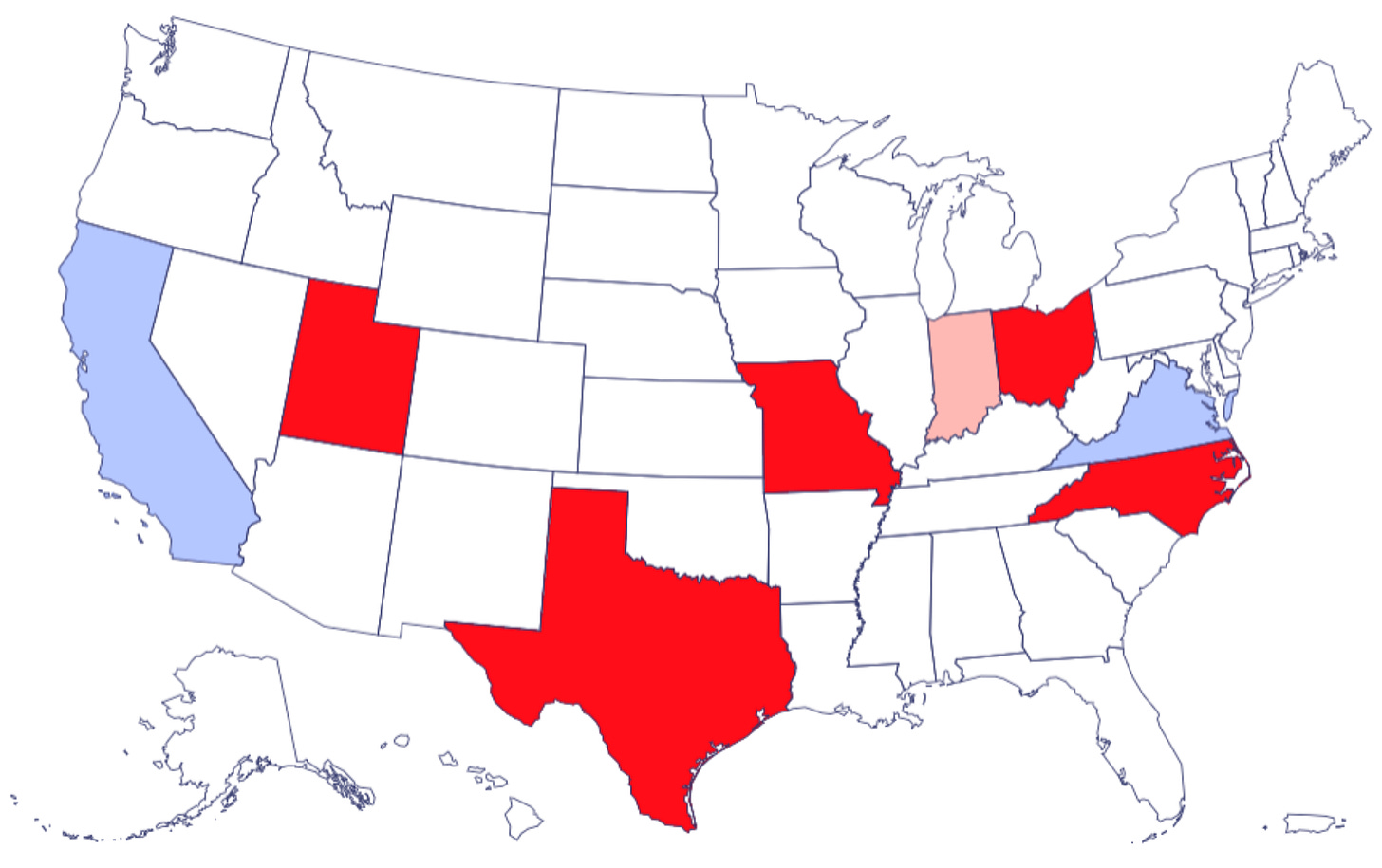As Dems sweep the election, a red-faced president proves indecorous

When George W. Bush’s Republicans took big hits in the 2006 midterms, the president acknowledged that the election was a “thumping” for the GOP. He said he wasn’t about to hold grudges for it but would work with Democrats “to get things done.”
Four years later, Barack Obama felt chastened by Democratic setbacks in that year’s midterms. He called GOP victories a “shellacking,” and added: “The responsibilities of this office are so enormous [that] sometimes we lose track of the ways that we connected with folks that got us here in the first place.”
So, now that Democrats in at least seven states gave Donald J. Trump and his party a bright blue middle finger in this year’s off-year pre-midterm races, how does he react? Humbled? Contrite, as he looks toward the fall Congressional midterms? Accepting responsibility, as prior presidents have?
Fuhgeddaboutit.
“‘TRUMP WASN’T ON THE BALLOT, AND SHUTDOWN, WERE THE TWO REASONS THAT REPUBLICANS LOST ELECTIONS TONIGHT,’ according to Pollsters,” the president wrote on Truth Social. And, even before the California redistricting vote went against him, the president called it a “GIANT SCAM” and “rigged,” promising a “legal and criminal review.” After the results came in – which could help Democrats flip the House next fall – he mysteriously threatened: “…AND SO IT BEGINS!”
Of course, we could have expected no better from Trump, who still insists his 2020 defeat was invalid. Just recently, he has been pressuring the Justice Department to find the fraud he insists cost him the White House that year.
Still, none of his absurd rhetoric could outweigh the anti-Trumpist results in California, New Jersey, New York, Pennsylvania, Virginia, Georgia and Mississippi. And, despite the president’s claim that he wasn’t on the ballot, he and his party surely were on voters’ minds – certainly on the minds of the political victors.
Promising to “usher in a generation of change,” for example, self-proclaimed Democratic socialist Zohran Mamdani in his victory speech as the next mayor of New York City called on supporters to “respond to oligarchy and authoritarianism with the strength it fears, not the appeasement it craves. After all, if anyone can show a nation betrayed by Donald Trump how to defeat him, it is the city that gave rise to him. And if there is any way to terrify a despot, it is by dismantling the very conditions that allowed him to accumulate power.”
Even as Trump has threatened to withhold federal funds from the city, Mamdani looked beyond the 79-year-old president.
“This is not only how we stop Trump; it’s how we stop the next one,” Mamdani said. “So, Donald Trump, since I know you’re watching, I have four words for you: Turn the volume up. We will hold bad landlords to account because the Donald Trumps of our city have grown far too comfortable taking advantage of their tenants. We will put an end to the culture of corruption that has allowed billionaires like Trump to evade taxation and exploit tax breaks.”

Echoing the view that the elections were a mandate on Trumpism, Democratic Virginia Gov.-elect Abigail Spanberger said voters sent a clear message. “We sent a message to the whole world that in 2025, Virginia chose pragmatism over partisanship,” she said. “We chose our commonwealth over chaos.” Then, she laughed when a supporter urged her to run for president.
In New Jersey, Democratic Gov.-elect Mikie Sherrill pointed to the Trump administration’s moves to cut federal food assistance to 42 million Americans, halt federal subsidies for Obamacare, and cancel the Gateway tunnel project. She promised to “fight for a different future in New Jersey.”
Throughout her campaign, the New Jersey Monitor noted, Sherrill worked to nationalize the race, painting it as a choice between democracy and the MAGA movement, reminding voters that Trump endorsed her Republican opponent. She echoed that in her victory speech, saying New Jersey residents “take oaths to the Constitution, not a king.”
The repudiation of Trump spread deep and wide including in a couple Trump bastions, as NPR reported. In Georgia, a couple Democrats were tapped to serve on the state’s five-person public utility regulator after earning roughly 60 percent of the vote. It’s the first time Democrats have won a nonfederal statewide office there since 2006.
Pennsylvania voters chose to retain three state Supreme Court judges who were first elected as Democrats, despite millions of dollars in spending driven by conservative billionaire Jeff Yass‘ efforts to reshape the state court’s politics. Democrats also won special elections for a seat on Pennsylvania’s Superior Court and a seat on its Commonwealth Court.
Also in Pennsylvania, Democrats swept the top “row offices” in Bucks County, electing the county’s first-ever Democratic District Attorney and defeating an incumbent Republican sheriff a year after Trump narrowly won there. As NPR noted, Democrats similarly notched commanding victories in county executive races in Erie, Lehigh and Northampton counties, all bellwether counties in recent presidential elections.
And in Mississippi, Democrats broke a GOP supermajority in the state Senate after flipping two seats there and picked up another state House.
Now, of course, as it prepares for the fall midterms and beyond, the Democratic Party has to figure out what course it will rally around. Does it go mainstream, embracing the center as Bill Clinton, Barack Obama and Joe Biden did?

Or does the party embrace the policies of the 34-year-old naif, Mamdani, as GOP pundits and right-wing media enthusiasts hope? The incoming mayor has promised to freeze rents in rent-controlled housing, raise the minimum wage to $30 an hour, eliminate fares on buses, create government-run grocery stores, offer free child care and pay for it all with stiff hikes in corporate taxes. Will the party endorse the Muslim mayor’s denial of Israel’s right to exist as a Jewish state and accept his reluctant repudiation of the term “globalize the intifada?”
The party could, instead, move toward the self-proclaimed moderate stances of Spanberger and Sherrill, women with powerhouse resumes far more substantial than that of the incoming New York mayor. Mamdani, a Bowdoin College graduate, worked as a foreclosure prevention housing counselor for an advocacy group, as a community organizer and then on several political campaigns before being elected to the New York State Assembly in 2020.
For their part, Spanberger and Sherrill lived together as members of the U.S. House, beginning in 2018, and were part of a group of Congresswomen who called themselves the “Mod Squad.” That was a centrist alternative to the leftist “Squad” of Alexandria Ocasio-Cortez of New York, Ilhan Omar of Minnesota, Ayanna Pressley of Massachusetts and Rashida Tlaib of Michigan.
Certainly, their backgrounds scream “Establishment” and “accomplishment.” Spanberger, 46, attended the U.S. Capitol Page School, has a B.A., from the University of Virginia and an M.B.A. from Purdue University, and worked as a teacher and postal inspector, and, for eight years served as a case officer for the Central Intelligence Agency. In her agency work she dealt with foreign nationals, meeting people undercover at times, and she carried five different passports at one point. She then served three terms as a Representative in Congress.
Sherrill, 53, is a Naval Academy graduate and former helicopter pilot who served nearly a decade in the military. She earned a master’s degree in global history from the London School of Economics and Political Science and a law degree from Georgetown University. After serving as a federal prosecutor and Assistant U.S. Attorney in New Jersey, Sherrill served four terms as a Congressional representative.

As for the GOP efforts to undermine elections and redraw maps to lock Republicans in safe districts, Trump’s press secretary, Karoline Leavitt, insisted to reporters on Election Day that it was “absolutely true that there are [sic] fraud in California’s elections. It’s just a fact,” Leavitt told them. “Fraudulent ballots that are being mailed in, in the names of other people, in the names of illegal aliens who shouldn’t be voting in American elections. There’s countless examples, and we’d be happy to provide them.”
She provided no evidence and, when asked for it, Leavitt again responded, “it’s just a fact.” She also said Trump is mulling over an executive order “to strengthen our elections in this country, and to ensure that there cannot be blatant fraud, as we’ve seen in California, with their universal mail-in voting system.”
Already, the California GOP has filed suit to block the redistricting, despite the nearly 64 percent approval vote state residents delivered. Trump’s party alleges that the maps were redrawn in a racist fashion, an argument apparently designed to meet Fourteenth Amendment concerns regarding racial gerrymandering.
Never mind that Trump got the gerrymandering ball rolling by ordering redistricting in Texas. He got it there and from GOP leaders and in Missouri and North Carolina. He’s likely to get his wish, too, in Indiana, which is planning a redistricting special session.
As Democracy Docket reported, two other GOP-led states have passed gerrymanders, but not solely at Trump’s request. Utah’s redraw was court ordered, and the new map, which is still being fought over in court, doesn’t net any gains for the GOP and could allow Democrats to pick up one seat. In Ohio, lawmakers were required to do a redraw and a new map passed last week could flip two out of five seats currently held by Democrats.
To be sure, the GOP gerrymandering efforts face legal and other challenges. Virginia Democrats plan to put the matter before voters next year and Missouri voters are organizing a citizen-led vote referendum on the matter. Overall, however, pundits say the battles could boost the number of GOP seats to entrench Trump’s party in the House, even as the map mischief disenfranchises minority voters and unfairly advantages one side or the other.
Much will happen between now and next November, of course. The economy could thrive or tank, inflation could rise or fall, international relations could improve or decline. If Trump were more of a rational actor and could take a lesson from this year’s vote, he could scale back on his overreaches — though that would hardly be in character. His inclination would likely be to double down and count on his party’s electoral map manipulations to bail it out.
For now, however, it seems clear that this election reflects disgust with Trump’s nine-month stint so far, which has earned him a 63 percent disapproval rating. As his niece, psychologist Mary L. Trump, put it in a post on X: “Raging narcissist claims that an election that rejected everything he stands for wasn’t about him. Good try, Donald. Loser.”
